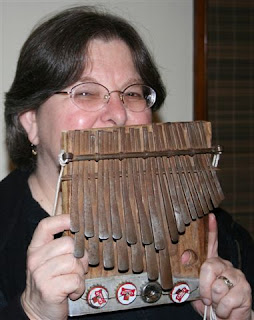So I’m in a marimba band. Why? Keeps the brain cells perking along in my old age. We’re learning a new piece called Ru. Although it was written by a young American, the style is African. The song is introduced and ends with a simple melody played on the m’bira – that’s the instrument I’m holding. As you may have guessed, I volunteered to learn the couple bars of music involved. Sounds easy enough, huh? Wrong!
I’ve already learned a couple of songs on the m’bira and I should have known. Truly, I should have…
To bring you up to speed, the m’bira is played with both thumbs and the right index finger. Except for the far right seven keys, none of the notes are sequential – in other words, they don’t go: do, re, me, fa, etc. More like the chiming of a clock – up, down, up, down. Add to this little list – the songs are, well, African – not Western by any stretch of the imagination. I’ve never heard a m’bira song that I’ve recognized.
So how do you learn a m’bira piece? That’s just the question I asked my teacher during my second lesson on Ru. I’d had three weeks to practice and I was still drawing a blank a good deal of the time.
‘Memorize three notes. Practice them over and over and over. Then learn three more. Practice. Put it together. Practice some more.’
I know this! Baby steps! I thought back to the years that I’ve spent in StandUp and realized that I would come away from the group with ideas that didn’t necessarily make a lot of sense at the time. They felt strange. They were hard. And I kept forgetting. But my group encouraged me to take baby steps and keep at it.
My yelling became a quiet response. My arguing became ‘Nevertheless’ or ‘Oh!’ Little by little, step by step, it all began to make sense.
I still depend on my group to help me focus on my goals for the week and continue to make baby steps in new areas. Check out our website in the sidebar and join us, won’t you?
I’ve already learned a couple of songs on the m’bira and I should have known. Truly, I should have…
To bring you up to speed, the m’bira is played with both thumbs and the right index finger. Except for the far right seven keys, none of the notes are sequential – in other words, they don’t go: do, re, me, fa, etc. More like the chiming of a clock – up, down, up, down. Add to this little list – the songs are, well, African – not Western by any stretch of the imagination. I’ve never heard a m’bira song that I’ve recognized.
So how do you learn a m’bira piece? That’s just the question I asked my teacher during my second lesson on Ru. I’d had three weeks to practice and I was still drawing a blank a good deal of the time.
‘Memorize three notes. Practice them over and over and over. Then learn three more. Practice. Put it together. Practice some more.’
I know this! Baby steps! I thought back to the years that I’ve spent in StandUp and realized that I would come away from the group with ideas that didn’t necessarily make a lot of sense at the time. They felt strange. They were hard. And I kept forgetting. But my group encouraged me to take baby steps and keep at it.
My yelling became a quiet response. My arguing became ‘Nevertheless’ or ‘Oh!’ Little by little, step by step, it all began to make sense.
I still depend on my group to help me focus on my goals for the week and continue to make baby steps in new areas. Check out our website in the sidebar and join us, won’t you?

